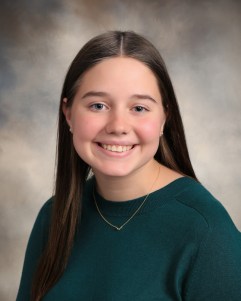Student preacher Kate Dugan ’22 shared this message with the Fenwick student body on April, 29, 2022.
We gather this morning to celebrate the Feast of St. Catherine of Siena. St. Catherine of Siena was born during the plague in Siena, Italy, on March 25, 1347. Though Catherine’s parents wanted her to marry, she was opposed to the idea and instead joined the Third Order of St. Dominic. At 21, she described herself as in a mystical marriage to Christ. She frequently visited hospitals and homes where the poor and sick lived. Catherine played an instrumental role in restoring the Papacy to Rome and forming peace deals during conflict and war in Italian city states. St. Catherine was also instrumental in the resolving of conflict between the two popes. She passed away at the age of 33. The exact reason is unknown, but she fell ill in January of 1380 and eventually passed away on April 29th. St. Catherine is the patroness against fire, illness and nurses, among many other things.

One of the most well-known St. Catherine quotes says “Nothing great is ever achieved without much enduring.” REPEAT. Now I don’t know about you, but I do know that my faith has been tested time and time again. It was tested when school was shut down because of a global pandemic. It was tested when we were told both my Grandma and Grandpa had cancer. It was tested when my brother was in a car accident that should have killed him. It was tested when my Grandpa passed away from said cancer last year in May. But through it, I have somehow found a way to strengthen my relationship with God.
In psychology class we learned about an idea that shapes the world view of many Americans. It is an idea called the Just-World Phenomenon in which someone believes that bad things happen to bad people and good things happen to good people. It’s something a lot of people in the world believe in, including me, up until recently. If the Just-World Phenomenon did exist and God could control who got hurt and who didn’t, then why did he let any of this happen to me and my family? How did he decide to take my Grandpa away from me so soon? It took me awhile and many long nights, but I finally realized that God had bigger and better plans for my Grandpa than I could ever imagine, and the only thing that I could do was pray for everything to turn out for the better, even if it meant losing family. It sounds corny, but everything has turned out exactly as it was meant to and has helped me to grow in my faith in God and as a person.
As graduation draws closer and the daunting task of college approaches, I think back to the quote mentioned before: “Nothing great is ever achieved without much enduring.” Now, after having been in this school for four years, I can confidently say there were many times I was tested and many times I either failed or prevailed. Most of you have big aspirations for what you want to do with your life, and I ask that you remember this quote. “Nothing great is ever achieved without much enduring.”
If you want something, it is hard work. Nothing ever comes easy. Every class here is designed to test your mental capabilities and your willingness to become a better and smarter version of yourself by the time you graduate. Fenwick wants you to take the lessons you learn here and apply them to the rest of your life and, if you do, you will do great things.

St. Catherine’s life inspires us to have a life of hope and trust in God. A trust that God will bring the right things forward to you and present you with only what he believes you are able to handle. St. Catherine’s commitment to her relationship with God and her willingness to follow God helped her to have an extraordinary life, just as we are meant to do. You are all here for a reason. You are completing homework assignments and taking tests for a reason — all for that higher goal. St. Catherine’s story serves as a reminder that if you are doing your best, that is good enough for God.
Kate Dugan (above) is a Fenwick senior from River Forest, IL.















